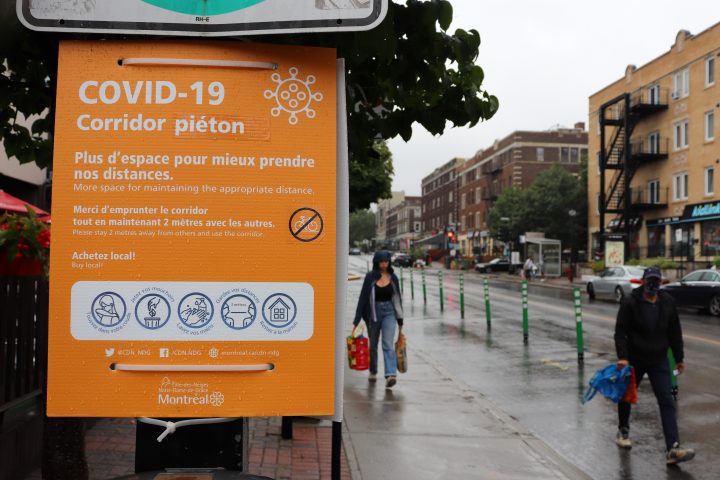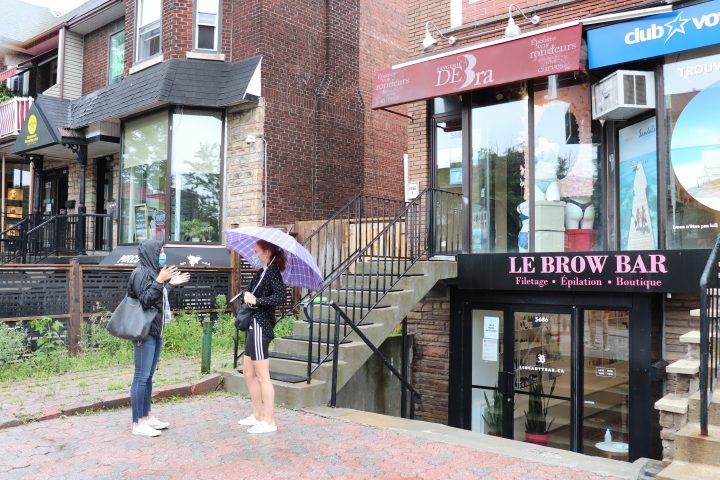The bustling retail street of Monkland Avenue in Montreal’s Côte-des-Neiges–Notre-Dame-de-Grâce borough has come back to life after slowly emerging from COVID-19 lockdown measures.

The return to business, however, has not been without challenges — something borough mayor Sue Montgomery acknowledges.
“COVID-19 has caused many hardships for businesses,” she said.
Located off Decarie Boulevard, Monkland Avenue is largely made up of small independent businesses.
While its merchants continue to implement public health measures, some are struggling with the loss of street parking.
“Many main arteries in the city have been turned into pedestrian streets for the summer,” said Pascal Salzman, president of Biz NDG, Monkland’s business association. “Some (merchants) are for it and some are against it.”
Salzman is also the owner of Monkland’s Le Cheese restaurant.
“Like most businesses, we are feeling the pinch of these times,” he said.

Monkland Avenue has had its “sanitary corridor” in place since Sunday, April 19. A part of the street is closed off to accommodate a wider pedestrian walkway.
“I’m an environmentalist,” said Debbie Donelle, owner of DEBra Lingerie. “But the reality is clients sometimes need to be able to take their cars to get to our store.”

Get breaking National news
After the months-long COVID-19 closure, Donelle recently reopened her Monkland location and is now operating at one-third capacity.
Most of her time is spent cleaning changing rooms and steam-cleaning her merchandise once customers leave the shop.
“To be honest, one client an hour, it’s almost not worth it,” she said. “But we had a lot of clients pretty much begging us to open, so we did.”
As Salzman puts it, his “new normal” consists of Le Cheese doing 85 per cent of orders through delivery providers, such as Uber Eats which charges a 30 per cent commission fee.
Also providing takeout is owner of MELK Café, Dominique Jacques.
“We’re really small inside,” Jacques said. “If we’re to reopen tables (inside), we could only reopen like three to four.”
A terrace, however, is set up at the front of his café with panels installed between tables as a COVID-19 precautionary measure.
“We are the police now,” Jacques said. “Even if you walk in with a mask, doing the right thing (…) we check all the way through.”
With most clients coming from Monkland Village, Jacques explained that the avenue expanding its pedestrian walkway is a good thing.
“People now are not coming in from far,” he said. “It gives more place to walk.”
The Canadian Federation of Independent Business (CFIB) told Global News that the borough must understand its merchants needs.
“It is true that removing parking will hurt some of the businesses,” said Gopinath Jeyabalaratnam, CFIB’s senior policy analyst. “Why they need parking spaces is usually because they have certain types of customers who don’t ride bikes or who can’t take bus or metro.”
Claire Himo, the owner of Sparkles, has a loyal clientele but explained that the walkway is hurting her candy and party supply business.
“Financially we’re just taking it day by day,” said Himo. “Crossing our fingers hoping to survive the pandemic.”
The borough, for its part, has established an emergency fund for shops to promote themselves and enhance delivery services. Sidewalk sale restrictions have been eased and fees are reduced for terraces.
In her comments to Global News, Montgomery said that she is proud the CDN-NDG borough responded with emergency support for businesses but did not address the specific issue of parking.
“We will continue to support our local businesses,” said Montgomery.
Donelle understands that the borough’s time and money must be prioritized during this pandemic, however, she doesn’t feel that they are helping by removing street parking.
“What I hate is when they say ‘were helping small businesses’ when they’re not,” she said. “It’s a political statement.”
Himo agrees.
“(The borough’s) always done the opposite of what is needed to help the businesses of NDG,” she said. “I just hope all the retailers can survive this crisis.”










Comments